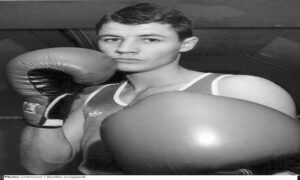Ringside Report Looks Back at Amateur Boxer Alan Vaughn
By Donald “Braveheart” Stewart
In 1992, I had just managed to get myself together and start a personal road to recovery on which I am still travelling. Sports was always my thing – to watch. Even in my youth I looked at my physique and realized I was always going to have to pay for participation, rather than be paid for my participation at any event. As a spectator, the Olympics became very special. From an early memory at age 7, the 1972 Olympics with all the positive focus on the likes of Mark Spitz and the pentathlon queen, Mary Peters from Northern Ireland, I was hooked. This was all despite the lack of genuine British interest in most of the Olympiad.
And so, a year into my own recovery, Barcelona happened. The 1992 Olympiad, 20 years after a European Olympics had totally captured my imagination, and I barely noticed it. For the 1992 squad, my lack of interest was hardly a cause for concern but as the Games progressed and I emerged more from my stupor, I realized it had been quite an Olympics for the British. It marked, for Team GB, a difficult time. It was a crossroads and for the boxers came the realization that we needed some kind of change to get back to the heady days of being competitive and in the hunt for medals.
At lightweight, Alan Vaughan was the youngest to ever appear up to that point as a boxer in the Olympics. He had also been the first British boxer to win a World Junior gold medal in 1990. At Barcelona, Vaughan’s record was less stellar. He came a cropper in his very first bout, against the Canadian, Billy Irwin. Irwin then went on to his next bout with the representative of the US. Having been able to stop Vaughan in his fight, confidence may well have been high in the Canadian camp, but then he was to face a certain Oscar De La Hoya. Needless to say, at that point, Canada lost their representative at that weight.
The Olympics were supposed to be his zenith and no less an authority than the US based Sports Illustrated had earmarked Vaughan for at least a bronze medal. His fight against Irwin had been tasty but also strange as Vaughan was stopped when even Irwin found it odd. Vaughan had been behind on the scorecards, though his first-round win was totally reversed by the type of scoring that did lead to the change in scoring systems being used. Irwin, without being dominant, was able to reverse the scores and take a commanding lead. When the fight was stopped, Irwin as he remarked later would have been unhappy had he been in Vaughans’ shoes. But Vaughan’s shoes were now pointed towards home and Merseyside.
When he returned from the Olympiad, Vaughan did not turn professional. Instead, he remained an amateur and in 1995, representing the Huyton Amateur Boxing Club (ABC) won the Amateur Boxing Association (ABA) light welterweight title. He added a European bronze medal to that haul, when he lost to the Irishman Paul Griffin – no disgrace as the southpaw featherweight from the Emerald Isle went on to win gold. As he had been spotted as a future Olympian, Vaughan was unable to compete for ABA titles prior to the Olympics, having his best kept fresh for the big competitions.
But his amateur pedigree was more solid than just the headlines. Despite that loss to De La Hoya, his win in the World Juniors had included beating a Cuban – at the time, and it often feels like every time, the Cubans were supreme in the amateur ring. Vaughan’s overall record is believed to be just short of 100 amateur fights fought and with less than 10 defeats. He represented his country several times including when England managed a 4-4 draw in 1995, though he lost in that event to Demarcus Corley.
Perhaps the most impressive part of Vaughan’s contribution to the sport was following his own National Junior Boxing Title in 1998, coaching a 15-year-old named Aaron to victory in the 50kg category. His coach? His dad! Later that year Aaron also went over to Ireland, won the 2016 Monkstown Cup and returned as the named best boxer of the tournament.
Unfortunately, his father’s life was to take the wrong turn and Alan became embroiled in an “enterprise” which was to be his undoing. Arrested, and eventually convicted of cannabis possession, intent to supply and was sent to prison for 2 ½ years. Since he came out, the most recent update as a Facebook post showing him running a marathon to raise funds for the Royal Society for the Prevention of Cruelty to Children. And that should be the greatest legacy he leaves as there is nothing more fitting, as I reflect in my own recovery, than doing something for someone other than yourself. Redemption, on order…
Click Here to Order Boxing Interviews Of A Lifetime By “Bad” Brad Berkwitt


